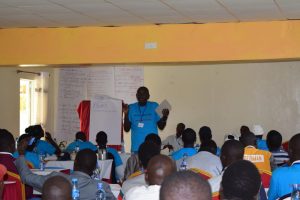‘‘I know it is beautiful, oh so beautiful to be initiated into womanhood…surely there is not a tribe that does not circumcise. Or how does a girl grow into a woman?’’ In his book, ‘The River Between,’ Ngugi Wa Thiong’o uses the character of Muthoni to portray one of the myths behind the circumcision of women among many communities in Kenya.
This practice is still very common in Kenya. Each day, I see more and more people calling out for governments and leaders to help stop this harmful tradition. While more people have come out to report on instances of Female Genital Cutting/Mutilation with various grassroots organizations sprouting to rescue girls who have either undergone the practice or face the risk of doing so, a new conversation is shaping up. This involves the role of men and boys in the fight against female genital mutilation.
‘In late 2012, I was volunteering with HIAS Refugee Trust of Kenya, an organization that works with urban refugees. The Prohibition of FGM Act had just been passed in October of 2011. The United Nations High Commission for Refugees was partnering with the organization and saw the need to sensitize the refugees on the new law. I was fortunate to be the best volunteer of the year for the organization and hence was given the opportunity to be a project assistant in the End FGM project. We were to sensitize urban refugees living in informal settlements within Nairobi such Eastleigh, Kayole, Githurai and Kawangware,’ Tony opens up on the beginning of his campaign.
It was then that Tony realized that he had to do extensive research in the practice of FGM. As they moved around conducting dialogues and sensitizing the refugees, he discovered that there are different types of FGM. For example, among the Rwandese, they pull the labia minora until the clitoris and the labia majora are fully stretched (Gukuna Imishino) , children use the Sodom apple juice as lubricant for the process.

“During the community dialogues, I interacted with a Somali man who narrated how his circumcised wife died after child birth due to excessive bleeding. The baby also died a few days after birth. After listening to such stories among the men, I asked myself how I could bring out the perspective of men in the fight against FGM. I later moved to Migori County to work with a government agency in Kuria subcounty. I decided to use all the knowledge I had gained to mobilise the men. This is how #MenEndFGM, an online campaign, started. I was trying to lobby organisations and policy makers to include men while working to eradicate FGM,’’ he explains.
When Tony started the online campaign, some of the reactions among people were negative. Some of the survivors of FGM have undergone extreme forms of abuse and hence it is difficult for them to trust men who want to be involved. The campaign has now moved into working with the communities at the grassroots level in places such as Baringo and Kuria.

“Our goal is to ensure that every person who works to fight FGM amplifies the importance of including men. However, this is challenging as many men are afraid of speaking up because they fear the backlash from the community. We need to make the conversation fashionable among men by using social media and mainstream media, especially vernacular radio stations, celebrity influencers and leaders at the grassroots level,’ he explains.
Religious leaders shouldn’t be left out of the conversation. This is mostly because of the fact that many of them are men (Catholics and Muslims just have male religious leaders). There is a misconception that FGM is a practice allowed in Islam. This is not true. Therefore, the Sheiks are important in clarifying this. Furthermore, the men never attend the FGM/Cutting ceremonies. This means that the men do not even know what happens during the cut and the complications thereafter. It is difficult to make such men understand the dangers of FGM, something that can be rectified through sex education.

Tony also discovered that many young men are misled during the initiation ceremony where they are told that a woman who has not undergone FGM is a curse or is dirty. Initiation ceremonies are great opportunities to teach young men about the dangers and the benefits of stopping the practice. It is also unfortunate to find that the people who protect the cutters are young men. During the ceremony, you find men carrying machetes to make sure nobody interferes. This makes it difficult for the girls to be rescued by the police.
Another way of making the conversation popular is through sports. Football tournaments can bring together all stakeholders in amplifying the message. These can be used as platforms to sensitize people and moving the conversations from conference rooms to the grass roots level.

It is no doubt that the male voice shouldn’t be left out. Gender equality can only be obtained if we ensure everyone is participating in making it possible. We can only do this if we leave our comfort zones and read more to understand what happens to women when they undergo FGM, talk to survivors and activists, engage more with communities and report such cases. When we know better, we do better.
